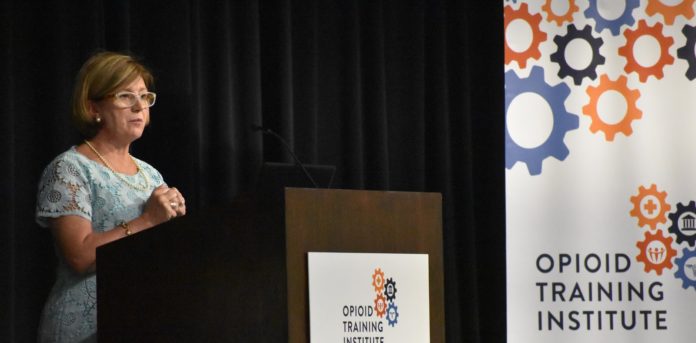
CULLMAN, Ala. – Representatives of the Opioid Training Institute (OTI), a collaboration between the Auburn University Harrison School of Pharmacy and the Alabama Department of Mental Health (ADMH), came to Cullman Wednesday to lead a day-long public seminar to help local authorities and citizens learn how to help combat the opioid crisis.
During a break between sessions, Harrison School of Pharmacy Assistant Dean Karen Marlowe told The Tribune, “The Opioid Training Institutes (OTI) are funded by the Alabama Department of Mental Health. These are free to all the participants. We’ve got two different types of programs. The one we’re doing here today is directed at community members.”
Marlowe continued, “We’ve got a wide group of people here today: we’ve got some law enforcement, we’ve got some social workers, some educators, I think we’ve got some school nurses here today, clergy, some counselors. The goal is to bring as many different groups from different walks of life, have them here learning. We’ve got lots of different sessions today: we’ve already heard from a law enforcement member; we’ve had somebody here from a recovery center. We’re going to address different types of treatment. We’re going to educate everybody here today on how to use Naloxone, the antidote for opioid overdose. We’re going to do that this afternoon. We’re also going to have a social worker talk about the different resources that are available in the state.”
The OPI also addressed local concerns.
“Within that, too, we’ve had a lot of discussion: we’ve had people talking about things that are going on here in this county and surrounding counties,” said Marlowe. “Yesterday we were in Huntsville, and we had a great discussion. We had some parole officers there yesterday, and they were talking to us about what’s going on and what they’re seeing in their profession. The goal is that discussion. We are providing the education, but also the discussion. As we do these around the state, hopefully, some of the things that are coming out of those discussions, people are learning from each other.”
She continued, “Some of our earlier sessions- we were actually able to forward some ideas to different colleges around the state. We had some ideas come out of the Birmingham session we sent to some college freshman orientation programs. So that’s kind of the three-part goal: is education, sharing of ideas, formulating new ideas that we can forward on, whether it’s to the ADMH or to others.”
Not just for professionals
Wednesday’s seminar, like many of OTI’s programs, was not just for the counselors, police and medical professionals. The organization also seeks to educate the general public, especially those impacted by the opioid crisis.
Said Marlowe, “Definitely, we have some folks who are just interested community members here today, and participating and able to ask questions. They’ve had a family member impacted, and they just want more information. We post all the slides; all the information is on our website.”
Attendees and others who are interested will be able to find follow-up information and webinars on the OTI website, with new offerings coming up regularly. OTI also offers a training series specifically geared toward medical professionals. For more information on OTI programs, visit http://alabamaoti.org.
Copyright 2019 Humble Roots, LLC. All Rights Reserved.



























